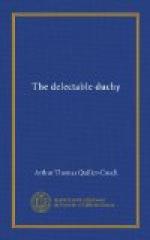“Ethel?” was all he found to say.
“Yes, Bob; I am Ethel. And God forgive you.”
Of the change in him she said nothing; but held out her hand with a smile.
“Marry me, Bob, or send me back: I give you leave to do either, and advise you to send me back. Twelve years ago you might have been proud of me, and so I might have helped you. As it is, I have travelled far, and am tired. I can never help you now.”
And though he married her, she never did.
II.—BOANERGES.
“Bill Penberthy’s come back, I hear.”
The tin-smith was sharpening his pocket-knife on the parapet of the bridge, and, without troubling to lift his eyes, threw just enough interrogation into the remark to show that he meant it to lead to conversation. Every one of the dozen men around him held a knife, so that a stranger, crossing the bridge, might have suspected a popular rising in the village. But, as a matter of fact, they were merely waiting for their turn. There is in the parapet one stone upon which knives may be sharpened to an incomparable edge; and, for longer than I can remember, this has supplied the men of Gantick with the necessary excuse for putting their heads together on fine evenings and discussing the news.
“Ay, he’s back.”
“Losh, Uncle, I’d no idea you was there,” said the tin-smith, wheeling round. “And how’s your lad looking?”
“Tolerable—tolerable. ’A’s got a black suit, my sonnies, and a white tie, and a soft hat that looks large on the head, but can be folded and stowed in your tail pocket.” Complacency shone over the speaker’s shrivelled cheeks, and beamed from his horn-spectacles. “You can tell ’en at a glance for a Circuit-man and no common Rounder.”
“’A’s fully knowledgeable by all accounts; learnt out, they tell me.”
“You shall hear ’en for yourselves at meeting to-morrow. He conducts both services. Now don’t tempt me any more, that’s good souls: for when he’d no sooner set foot in th’ house and kissed his mother than he had us all down on our knees giving hearty thanks in the most beautiful language, I said to myself, ’many’s the time I’ve had two minds about the money spent in making ye a better man than your father;’ but fare thee well, doubt! I don’t begrudge it, an’ there’s an end.”
A small girl came running down the street to the bridge-end.
“Uncle Penberthy,” she panted, “your tall son—Mr. William—said I was to run down and fetch ’ee home at once.”
“Nothin’ wrong with ’en, I hope?”
“I think he’s going to hold a prayer.”
The little man looked at the blade of his knife for a moment, half regretfully: then briskly clasped it, slipped it into his pocket, and hobbled away after the messenger.




